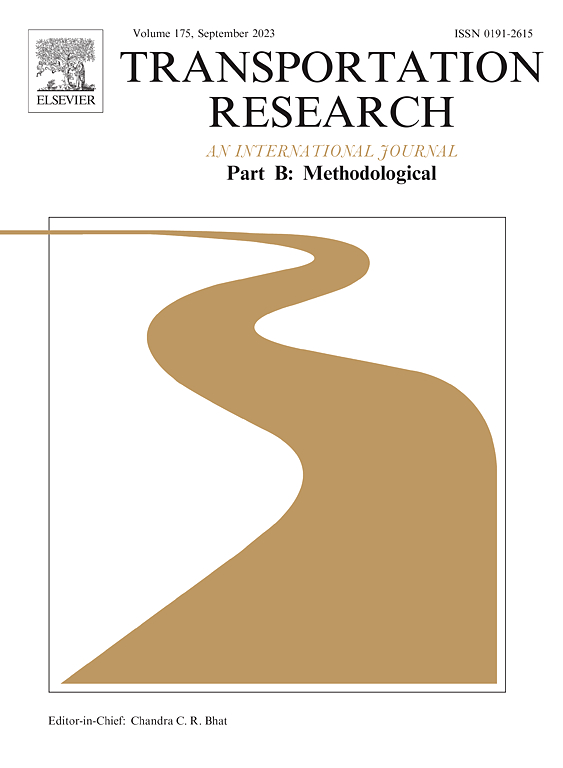在有限的城市空间内规划自行车网络
IF 5.8
1区 工程技术
Q1 ECONOMICS
引用次数: 0
摘要
城市环境中自行车基础设施的缺乏阻碍了人们将自行车作为一种可行的通勤方式,尽管(电动)自行车作为一种可持续、高效、促进健康的交通方式有着明显的好处。自行车网络规划是一个繁琐的过程,依赖于启发式计算方法,经常忽视引入新的自行车基础设施的更广泛的影响,特别是改变车道用途的必要性。在这项工作中,我们呼吁优化自行车和汽车网络之间的权衡,有效地推动帕累托最优。这种观点的转变产生了一种新的线性规划公式,用于优化自行车网络分配。我们使用真实世界和合成数据进行的实验证明了与启发式方法相比,这种优化方法的有效性和优越性。特别是,该框架为利益相关者提供了一系列车道重新分配方案,说明了潜在的自行车网络增强及其对汽车基础设施的影响。至关重要的是,我们的方法适用于各种自行车和汽车可达性评估标准,使我们的工具成为城市规划的高度灵活和可扩展的资源。本文提出了一个先进的决策支持框架,可以极大地帮助城市规划者在自行车基础设施发展方面做出明智的决策。本文章由计算机程序翻译,如有差异,请以英文原文为准。

Bike network planning in limited urban space
The lack of cycling infrastructure in urban environments hinders the adoption of cycling as a viable mode for commuting, despite the evident benefits of (e-)bikes as sustainable, efficient, and health-promoting transportation modes. Bike network planning is a tedious process, relying on heuristic computational methods that frequently overlook the broader implications of introducing new cycling infrastructure, in particular the necessity to repurpose car lanes. In this work, we call for optimizing the trade-off between bike and car networks, effectively pushing for Pareto optimality. This shift in perspective gives rise to a novel linear programming formulation towards optimal bike network allocation. Our experiments, conducted using both real-world and synthetic data, testify the effectiveness and superiority of this optimization approach compared to heuristic methods. In particular, the framework provides stakeholders with a range of lane reallocation scenarios, illustrating potential bike network enhancements and their implications for car infrastructure. Crucially, our approach is adaptable to various bikeability and car accessibility evaluation criteria, making our tool a highly flexible and scalable resource for urban planning. This paper presents an advanced decision-support framework that can significantly aid urban planners in making informed decisions on cycling infrastructure development.
求助全文
通过发布文献求助,成功后即可免费获取论文全文。
去求助
来源期刊
CiteScore
12.40
自引率
8.80%
发文量
143
审稿时长
14.1 weeks
期刊介绍:
Transportation Research: Part B publishes papers on all methodological aspects of the subject, particularly those that require mathematical analysis. The general theme of the journal is the development and solution of problems that are adequately motivated to deal with important aspects of the design and/or analysis of transportation systems. Areas covered include: traffic flow; design and analysis of transportation networks; control and scheduling; optimization; queuing theory; logistics; supply chains; development and application of statistical, econometric and mathematical models to address transportation problems; cost models; pricing and/or investment; traveler or shipper behavior; cost-benefit methodologies.

 求助内容:
求助内容: 应助结果提醒方式:
应助结果提醒方式:


